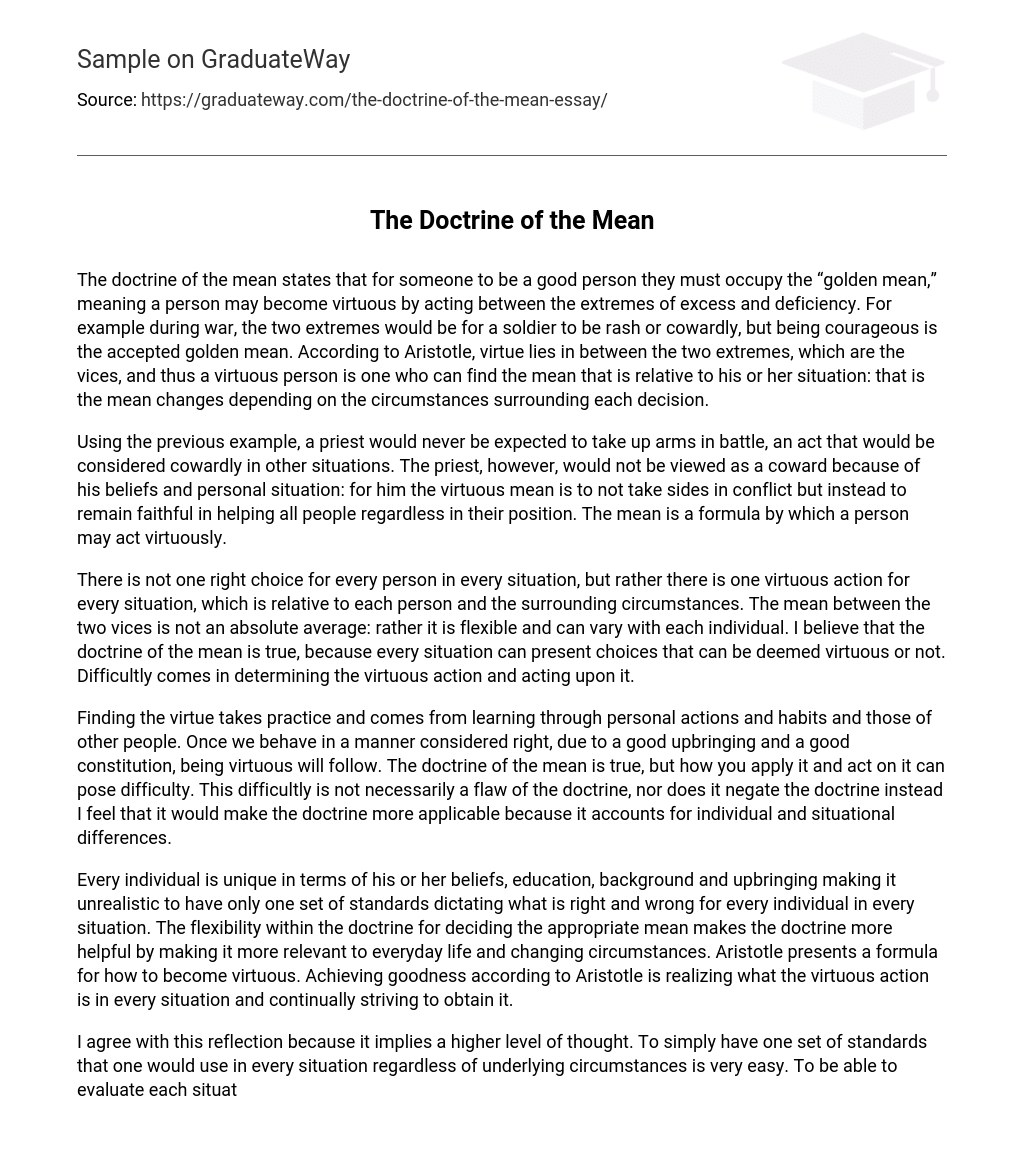According to the doctrine of the mean, in order to be a good person, one must achieve the “golden mean.” This means that virtue is attained by acting between the extremes of excess and deficiency. For instance, in a time of war, a soldier can either act rashly or cowardly, but the virtuous action lies in being courageous, which is the accepted golden mean. Aristotle believed that virtue exists between the two vices of excess and deficiency, and thus a virtuous individual can identify the appropriate mean based on their specific circumstances. Therefore, the mean fluctuates depending on the surrounding factors influencing each decision.
Considering the previous example, in a scenario of battle, it is not expected for a priest to engage in combat. Such an act would be seen as cowardly in other circumstances. However, due to the priest’s beliefs and individual circumstances, he is not perceived as a coward. For him, the virtuous approach is to refrain from aligning with any side in the conflict and instead faithfully assist all individuals irrespective of their position. The mean represents a guideline through which a person can consistently exhibit virtuous behavior.
The right choice differs for each individual and situation, but there is always one morally right action that is relative to each person and their circumstances. The middle ground between two vices is not a fixed average, but rather it is adaptable and can change for each person. I agree with the concept of the mean doctrine because every situation has options that can be considered virtuous or not. The challenge lies in figuring out the virtuous action and following through with it.
Practicing and learning from personal actions and habits, as well as observing others, is key to finding virtue. By behaving in a morally upright manner, influenced by a good upbringing and constitution, one can become virtuous. While the doctrine of the mean is true, implementing and acting upon it can be challenging. However, this challenge does not undermine the doctrine, but rather enhances its applicability by acknowledging individual and situational variations.
The uniqueness of individuals in their beliefs, education, background, and upbringing makes it impractical to impose a single set of standards for determining what is right or wrong in every situation. The doctrine allows for flexibility in determining the appropriate action, making it more applicable to daily life and evolving circumstances. Aristotle offers a formula for achieving virtue, which involves recognizing the virtuous action in each situation and relentlessly pursuing it.
I concur with this reflection as it suggests a more advanced level of contemplation. Merely possessing a singular set of criteria that one would employ in every circumstance, regardless of the underlying factors, is quite effortless. However, being able to assess each situation as distinct and take into account the specifics before determining an apt course of action signifies a deeper dedication to genuinely striving to act virtuously in every situation. Consequently, this enhances the individual’s virtuousness since they are compelled to thoroughly analyze the issue at hand.
The first step in our learning process is influenced by habit. Then, we adapt these habits to suit various situations while considering the doctrine of the mean. However, depending solely on the doctrine of the mean might not always be advantageous when making decisions. It is crucial to differentiate between knowing what needs to be done and actually implementing it. In fact, some may argue that adhering to the doctrine of the mean exacerbates decision-making difficulties because doing what is right may not always be the simplest choice.
During times of war, soldiers acknowledge the obligation to combat for their country, regardless of being separated from loved ones. The doctrine of the mean offers direction in determining the correct action, albeit not applicable in every circumstance. Occasionally, individuals can exhibit virtuous conduct without strictly adhering to the mean. For instance, if an individual is struggling in the ocean and you courageously opt to plunge in and rescue them, you would be endangering your own life and defying reason to save another person.
When faced with a situation where time is crucial and no other option is available, jumping into the water can be the appropriate action, even though calling 911 or informing the lifeguard would have been alternatives. Although this choice may seem extreme, it is not excessive as it has been tailored to fit the specific circumstances. Therefore, individuals can still exhibit virtuous behavior even when their actions differ from what is considered normal. This demonstrates that vices and virtues can vary depending on the situation, and it ultimately falls on the individual to make the morally right choice.





